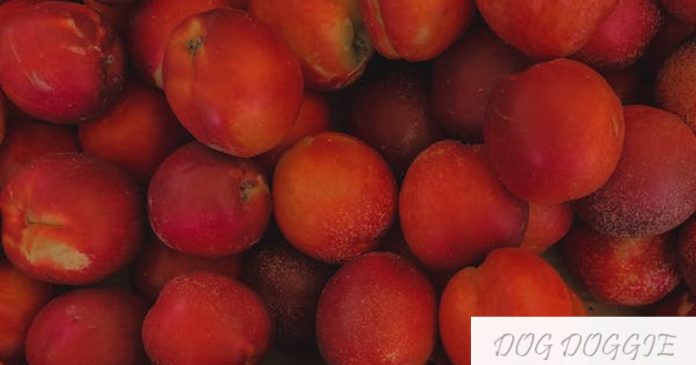The question that people frequently ask is, “Are peaches safe for dogs?” Dogs that are in reasonable health may, however, enjoy small pieces of peach as a treat without any problems. This is because they contain a lot of fiber but few calories and almost no fat. In addition, they are chock full of healthy antioxidants that fortify the immune system, protect cells from harm, and ward off illness.
In our research on peaches, we discovered the following nutrients:
- Zinc
- Copper
- Lutein
- Zeaxanthin
- Choline
- Folate
- Phosphorus
- Manganese
- Niacin
- Magnesium
- Vitamin K
- Vitamin E
- Vitamin C
- Vitamin A
One of the best things about summer is eating luscious, fresh peaches. So if you want to know if it’s OK to give your dog a taste of this beautiful food, the answer is “yes,” but with some restrictions. After all, canines are carnivores that have no nutritional need for fruit. In addition, dogs have a digestive system distinct from ours, so they can’t eat everything safe for humans.
Vitamin A and fiber may both be found in abundance in peaches. Dogs may eat peach flesh that has been adequately prepared, such as in little bits. On the other hand, if peaches aren’t a staple in his diet, he may have some gastrointestinal distress, most often in the form of brief diarrhea.
Don’t give your dog any human food preserved with peaches. They are unhealthy for your dog because of the excessive levels of sugar and possibly harmful preservatives or artificial sweeteners they contain.
Most store-bought fruits are treated with potentially dangerous chemicals. Please keep your dog (and yourself) safe by washing peaches well before snacking on them.
The peach pit, or stone, presents the most significant threat. The amygdalin in peach stones is a sugar-cyanide combination. It would take a lot of peach pits for a dog to get ill, but why take the risk with something that may be poisonous? The hole presents a few additional risks. First, the whole thing may get stuck in your dog’s throat if he attempts to swallow it. The pit of a peach has a rough, serrated surface that may be abrasive and irritate the small intestine, as anybody who has ever pitted a peach knows.
Point To Remember:
Finally, remember that all parts of the peach tree, including the leaves and stems, are cyanide-rich, whether you cultivate your own or harvest peaches from a farmer’s market or orchard.
Do Peaches Pose Any Danger to Dogs?
When does it become too much? Even if it’s a nutritious treat like peaches, a dog shouldn’t get more than 10 percent of its calories from treats daily; the rest should come from a complete and balanced diet. The maximum cube size for any one piece is half an inch.
You may use this chart as a starting point for determining the ideal daily peach intake for your dog.
Only 1 or 2 servings are required for a tiny dog weighing between 2 and 20 pounds (examples: Yorkies, Chihuahuas, Pomeranians, Pugs, Shih Tzus).
Two to three pieces for a small dog (between 21 and 30 pounds) (examples: Basenjis, Beagles, Miniature Australian Shepherds)
You’ll need four to five pieces if your dog weighs between 31 and 50 pounds (examples: Basset Hounds, Border Collies, Australian Cattle Dogs, Siberian Huskies).
You need five to six servings for a large dog (one that weighs between 51 and 90 pounds, like a Pit Bull, German Shepherd, Labrador Retriever, or Australian Shepherd).
large dog (above 91 pounds), a small pile (examples: Newfoundland, Bernese Mountain Dogs, St. Bernard, and Great Pyrenees)
Keep an eye out for these signs if you’re worried your dog may have eaten too many peaches:
- Abdominal pain
- Loss of Appetite
- Difficulty breathing
- Abnormal heartbeat
- Red gums
- Excessive painting
- Gagging or regurgitation
- Vomiting
- Diarrhea
- Lethargy
- Dilated pupils
- Seizures
- Collapse
If your dog has eaten the pit from a peach or if you observe any of these symptoms, it is essential to get him to the doctor as soon as possible.
The Proper Way to Give Your Dog Peaches:
Here are some creative and secure methods to reward your dog with a peach. Start with a little amount if you’re trying to get your dog used to a new meal. Then, after removing the stem and pit, slice the peach into little cubes (about 1/2 inch in size).
Frozen yogurt or peach yogurt:
Mix some peach slices that have been mashed or blended with some plain, sugar-free, xylitol-free yogurt. Feel free to experiment with different safe fruits for dogs and serve this to your pet in the refrigerator. You can also prepare dog-friendly frozen yogurt by chopping up some fruit the night before, freezing it, and blending it with plain yogurt. Limit the amount of yogurt given to your dog to no more than two tablespoons for every 10 pounds of body weight.
It would be best if you didn’t feed your dog store-bought peach yogurt because of the artificial colors, tastes, and preservatives. Yogurt, in general, might cause digestive issues for lactose-intolerant dogs.
Peach yogurt is a tasty treat that should make at home by mixing plain yogurt with organic peaches. You should start with a small serving to see if your pet can tolerate yogurt. Don’t give them any yogurt if they show signs of discomfort.
Even if it’s OK to give your dog some peach yogurt, you should provide just a little quantity to be sure it doesn’t harm their health.
Dehydrated Peaches:
Dehydrated peaches may be made home using a dehydrator and are a healthy treat for your dog. Think of it as having a more amazing sugar content at this stage. Dried fruit from the store often has considerably more sugar added and occasionally additional preservatives, making homemade dehydrated fruit a far better option. In addition, they may avoid choking hazards if the pieces are incredibly tiny.
Cyanide Can Be In Some Peach Components:
Peach flesh is safe for canines to consume, although there are amygdalin residues in the plant’s other components.
Not only do peach pits, leaves, and stems contain amygdalin, but so do peach flesh and juice. Hydrogen cyanide, which is hazardous in large concentrations, is the byproduct of this compound’s breakdown by the digestive enzymes in a dog’s gastrointestinal tract. The good news is that most dogs would have to consume quite a few peach pits before getting a deadly dosage of cyanide from the trace levels of amygdalin in a single hole.
A dog with liver problems would be an exception to this rule. On the other hand, your dog’s susceptibility to cyanide poisoning may increase if his liver cannot properly filter out poisons like cyanide. Whatever the case, you should never give your pet access to peach pits because of the many potential dangers they offer if swallowed.
Additional Potential Health Dangers:
You should also be aware of a few minor dangers of eating peaches.
When giving a peach to a dog, if you want to prevent toxic herbicides or pesticides, you should always wash a peach before giving it to him. Use these substances with caution; even if they pose little danger when applied correctly and at the recommended doses, doing so is still not a good idea.
While it’s unlikely that your dog has an allergy to peaches, it is possible. Hives, profuse drooling, and even respiratory distress and death are all possible symptoms of an allergic response. So always test a small quantity of new food on your dog to ensure he doesn’t have any adverse reactions, and peach is no exception.
You shouldn’t feed your dog canned peaches, particularly if they’re swimming in syrup. These often include a lot of sugar and sometimes even artificial sweeteners like xylitol, which may be deadly to dogs.
Questions & Answers
How about some dog-friendly fruits?
Peaches, apples, bananas, pears, and blueberries are just a few examples of the numerous fruits that dogs may safely consume. However, the ingestion of some fruits may be harmful. Therefore, consult with your vet before giving your pet any new foods. Also, remember that dogs’ primary diet consists of meat, so only give them fruit as a treat sometimes.
Are peaches toxic to canines?
Dogs are safe to eat fresh peaches, but they may die if they eat the pit or if the fruit has gone wrong. If your dog has a severe allergy to beauty, there is a very slight chance that it may have an anaphylactic response, which can be fatal. This would, however, be a highly unusual occurrence.If you wont To Know about visit the website” Dog Doggie“.





